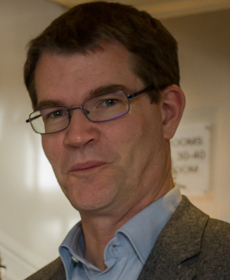A word from the EP Deputy Department Head - December 2023
 As we look back on 2023, we can reflect on a year with many challenges, but also many achievements, that you can read about in this December edition of the EP newsletter. The flagship CERN accelerator, the LHC, had a year of two halves, with an efficient start-up and record performance up to mid-July, followed by a series of problems related to vacuum leaks. But thanks to the rapid reaction and ingenuity of our accelerator colleagues, plus great flexibility in the experiments, it was still possible to complete the special run and heavy-ion programmes. The rest of the experimental programme had a very successful year, with several exciting new results being announced, and activities preparing both the short- and long-term futures continued apace, including LHC upgrades, future fixed-target experiments, detector R&D and the mid-term review of the FCC-ee project for a future collider to follow the LHC.
As we look back on 2023, we can reflect on a year with many challenges, but also many achievements, that you can read about in this December edition of the EP newsletter. The flagship CERN accelerator, the LHC, had a year of two halves, with an efficient start-up and record performance up to mid-July, followed by a series of problems related to vacuum leaks. But thanks to the rapid reaction and ingenuity of our accelerator colleagues, plus great flexibility in the experiments, it was still possible to complete the special run and heavy-ion programmes. The rest of the experimental programme had a very successful year, with several exciting new results being announced, and activities preparing both the short- and long-term futures continued apace, including LHC upgrades, future fixed-target experiments, detector R&D and the mid-term review of the FCC-ee project for a future collider to follow the LHC.
The first physics measurements from Run 3 LHC data at the unprecedented collision energy of 13.6 TeV are starting to appear, also providing ATLAS an opportunity to exercise the new data format to be used at the HL-LHC upgrade. To fully exploit the new data, both ATLAS and CMS have increased the performance and capabilities of their trigger systems, and these upgrades are now bearing fruit, as several articles describe. This year saw the first LHC heavy-ion physics run since 2018, which should enable new insights into the properties of the quark-gluon plasma, exploiting the detector and trigger upgrades all four LHC experiments have made in LS2. By combining their results, ATLAS and CMS have also improved the measurement of the top quark mass, the culmination of a decade-long effort to fully exploit data from the first LHC run in 2011-12. Returning to the present LHC run, you can read about the completion of the first set of LHCb detector upgrades, particularly the Upstream Tracker, and the work to restore the LHCb VELO to full operation in preparation for 2024 data-taking.
Away from the LHC, the ALPHA collaboration at the CERN antimatter factory has demonstrated that antimatter falls downwards in a gravitational field, heralding the start of a new precision measurement programme. The CERN neutrino platform and EP-NU group have a leading role in preparing the next-generation DUNE long-baseline experiment in the US, especially through the proto-DUNE LAr TPCs which are preparing for their second experimental run next year. At the ISOLDE facility, the recently upgraded Miniball spectrometer has shed new light on the shapes of exotic nuclei, and the unique CLOUD experiment at the PS continues to advance our knowledge of atmospheric physics and climate science, demonstrating the influence of trees on cloud formation in the atmosphere above them.
Looking towards the future, you can read about the SHADOWs feebly-interacting-particle search experiment proposed for the SPS ECN3 upgrade in the North Area. This proposal, along with those submitted by the HIKE and SHiP collaborations, are currently discussed, and a final decision is expected early in 2024. This issue of the newsletter also highlights the ongoing work on hybrid silicon detectors in the EP R&D programme. The latter development relies strongly on the unique facilities available at CERN, such as the venerable ‘AsteriX and ObeliX’ X-ray irradiation systems used to explore the effects of radiation on electronics. CERN’s expertise was also reflected in two recent events – the Micro Pattern Gaseous Detectors School held at CERN, and the Rucio and DIRAC distributed computing workshop held in Japan. Further ahead, the five-year FCC feasibility study has reached the mid-point, and you can learn about the current status of the project as presented to the midterm review.
Finally, Valentina Cairo, the winner of the 2023 EPS-HEP Young Experimental Physicist prize, reflects in an interview on her career to date, and you can read short profiles of new arrivals in the EP department. As year-end food for thought, you are also invited to contemplate all the objects in the Universe from an unusual perspective.
On behalf of all the EP department management, I wish you happy reading, and best wishes for a relaxing and refreshing Christmas and end-of-year break. See you in 2024!
